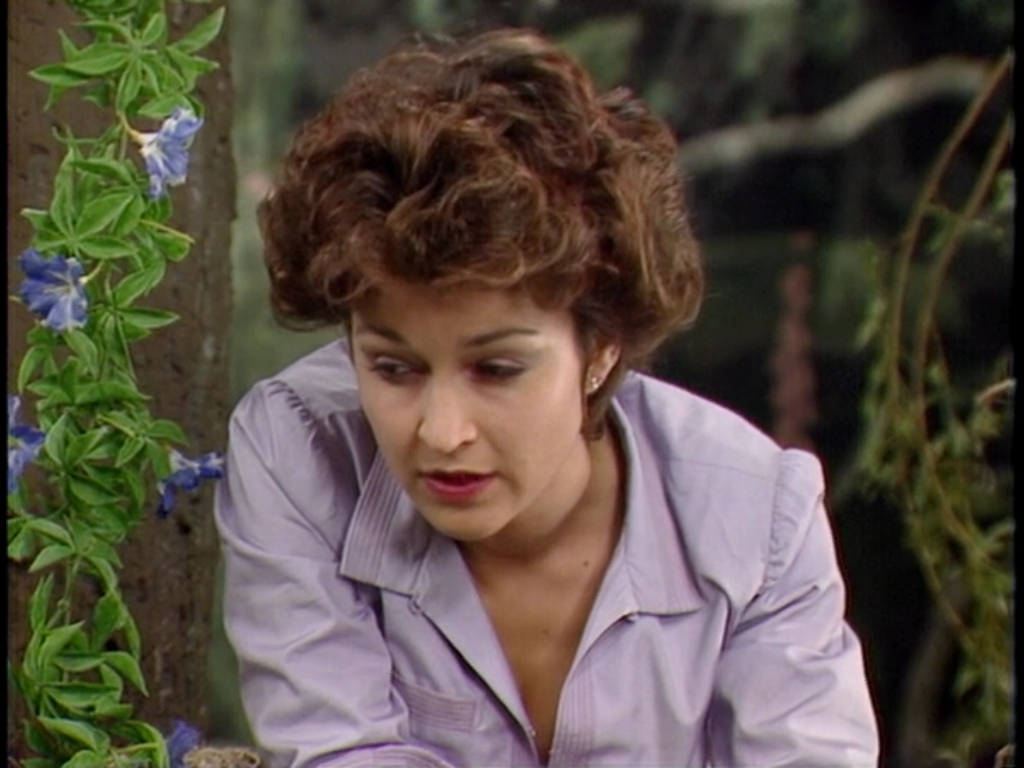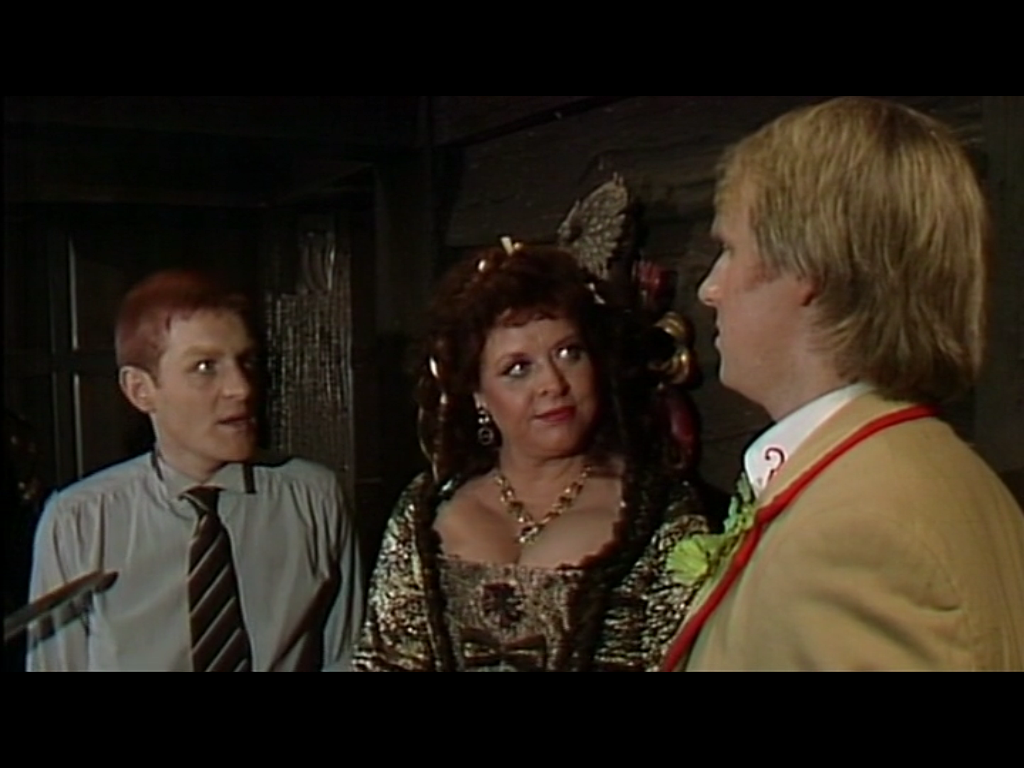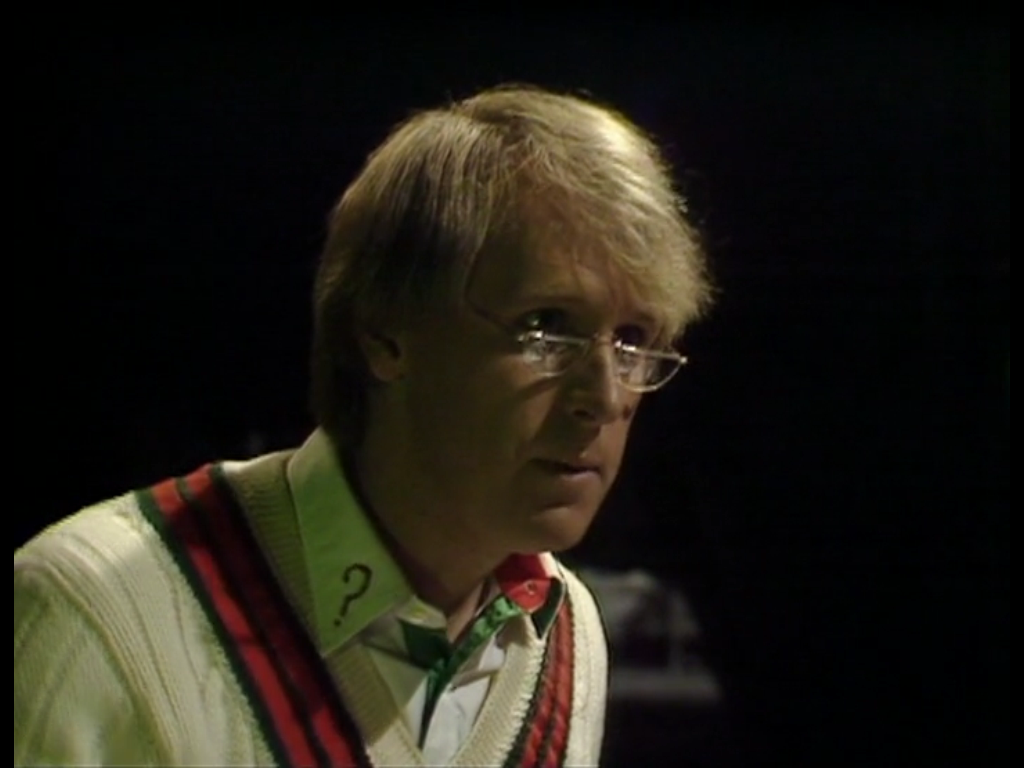When I first started regularly watching Doctor Who (versus encountering the occasional episode here or there), it was near the end of Peter Davison’s run. Even though it was only a few stories before his hand-off to successor Colin Baker (more on him next month), I’ve always had a fondness for Davison as a result. Davison had a tough challenge ahead of him; after all, he was replacing someone who’d been on the show for seven seasons, a record still unsurpassed to this day.
Davison was also, for many years, the youngest actor cast as the Doctor, just 29 years old when his first story was broadcast. (Matt Smith eventually beat that.) The fresh-faced Davison also had a brand new script editor coming on board during his run (Eric Saward) whom, it could be argued, hated the show that he was working on. The end result is a run that’s a bit all over the place and problematic in places, although the biggest problems with Saward being in charge were yet to come.
Anyway, for this month’s selections, I picked three stories where I love the scripts. The production of some of these is better than others, but I feel that if you’re talking about the writing of the Davison era, all three of these need to be flagged in a positive manner.
The genesis of “Kinda” is a long one; new writer Christopher Bailey originally wrote it for the previous season, with (presumably) the 4th Doctor and Romana, but since had to rewrite it for a new cast with the 5th Doctor, Adric, and Tegan. By the time the scripts were completely rewritten, though, the decision had been made from on high to add in one more companion, Nyssa. The end result? Nyssa takes a medically-needed nap in the first few minutes of episode 1, and isn’t seen again until the last minutes of episode 4. So for that alone, this story stands out.
But more importantly, “Kinda” has a just wonderful script. It’s influenced by Buddhism, has a series of villains that aren’t really villains at all, and also tackles the ideas like colonialism and gender-assumptions. It is, in a word, marvelous. There was nothing quite like “Kinda” and I don’t think there ever will be again. This is a story where Tegan gets trapped in her own mind with a creature that lurks in the dark spaces of humanity, where a major adversary is depicted as having been abused and whose real problem is teetering on the edge of a (quite realistic) nervous breakdown, and where the native species is quite uninterested in any of the “idiot” men.
There are a couple of production triumphs in this story, too. The possessed Tegan works surprisingly well (especially considering it’s not as long as you might remember) because of Janet Fielding’s acting; she speaks in a deeper, more languid voice, and her body language is so different from the character of Tegan that she normally plays that they didn’t even need the heavy eyeshadow or extra button undone on her shirt to flag what was going wrong. I was also impressed with some of the other little moments, like when the Kinda fight the Total Survival Suit and director Peter Grimwade keeps the angles just right so that you can’t see who’s inside it (but not in an obvious way), or how Grimwade really did his best to disguise that they’re in a studio and not a real forest. And sure, everyone always points to the big rubber snake at the end of the story, but honestly? It’s not that bad. (If you really hate it, the DVD has an option to have it swapped out with a more realistic and modern effect.) “Kinda” is my favorite Davison story, and every time I watch it I find more to love. This was a story well ahead of its time.
The first Doctor Who story to be written by a woman, Barbara Clegg’s “Enlightenment” always saddens me that she never contributed again. (There’s one earlier that has a co-writing credit that so far as all production documentation shows, she didn’t actually contribute to in any way shape or form, so I’m not counting it.) It’s a beautifully inventive story, one involving a race of eternal beings that need mortals to fill their empty minds, sailing ships that fly through outer space, and one of the creepiest “wait, this isn’t romantic at all” characters in the show’s history.
My one caveat about recommending “Enlightenment” to friends is that it’s the end of a loose trilogy of stories, where new companion Turlough has made a deal with the devil (in this case, the evil Black Guardian) to kill the Doctor, and this wraps that storyline up. That said, I think most people can twig what’s happening on that front, and there’s so much more going on too. An unapologetically lusty female pirate captain (whom, shockingly, does not have cleavage completely falling out of her dress) named Captain Wrack steals every scene she’s in, and Mariner the Eternal’s need to be around Tegan will progressively unsettle you the more the story progresses.
Even the overall mood of “Enlightenment” is grand; there’s something wonderful about a story where the big prize everyone’s fighting for isn’t quite what it seems, but never in a blatant, in-your-face manner. There’s a level of elegance present that keeps this story a real charmer, and it’s quite re-watchable. There’s also a “special edition” re-edit (with the director involved, no less) that cuts the time down a few minutes, updates the effects, and removes whenever possible the dreadful actor Leee John (no, that’s not a typo, and trust me, he’s awful). I didn’t think this story needed a re-edit, but having watched it for this, I was impressed with how it feels like any dead weight has been sliced out entirely. Good stuff.
“Frontios” is a story that I could actually see being made by the modern, 21st century Doctor Who series. There’s a lot going for it: the last dregs of humanity at the far end of time trying desperately to survive, the idea of something under the earth dragging them to their doom, the colony forever teetering on the edge of insurrection. It’s a surprisingly bleak script in places, and while there are a few quibbles I have with bits of the script (this was the era when apparently everyone knew who the Time Lords and the Doctor were), on the whole it’s a great example of how to take dark subject material and still make it all-ages appropriate without watering it down, either.
While some of the long shots are cringe-worthy, on the whole I was surprised at how good the colony on the planet Frontios is depicted. It really feels like a run down, ramshackle place that is one generation away from utter destruction. The director even understands how to use dim lighting, something that I wish the previous season’s story “Terminus” had as well. (It may sound like a strange thing to praise, but trust me, a brightly lit set that’s supposed to be dingy and dark is a real disaster.) And Tegan’s inappropriate-for-adventuring outfit aside (a leather skirt, really?), I was pleased at how much Tegan and Turlough are given to do in this story. They’re not forgotten or sidelined (a big problem in much of Davison’s stories), and I like that they get central roles without pulling things away from the Doctor.
While I’m at it, I love the depiction of the Doctor here. Like in (former script editor) Christopher H. Bidmead’s other story “Castrovalva,” the Doctor gets to wear his half-moon glasses and there’s a real contrast between the youthful body and the older mind that wears it. (A depiction I wish they’d gone for, but which went away when Bidmead didn’t stick around after shepherding the departure of Tom Baker.) He gets to give us some gravitas, some real sorrow… it’s more than just technobabble and running. I can’t help but think if he’d had some more scripts like this one during the middle portion of his time on the show, he might’ve stuck around for another year.
Next up: the Colin Baker era, which I think it safe to say is probably the most problematic time in the show’s history. Brace yourself.



Greg McElhatton: 50 Years of Doctor Who: Peter Davison http://t.co/fMnKzmzqGt
@gregmce I’m loving this series, Greg. Nice work!
So grateful you have catalogued these for when we finally get to watch them! Thank you, dear librarian…
RT @SFWAauthors: Greg McElhatton: 50 Years of Doctor Who: Peter Davison http://t.co/fMnKzmzqGt